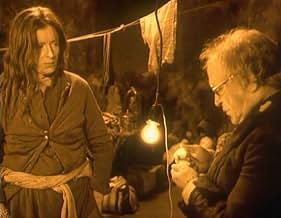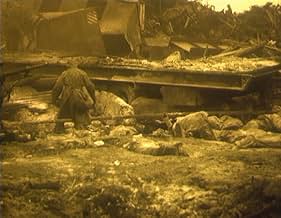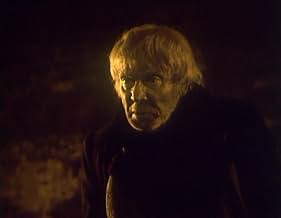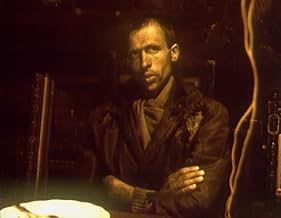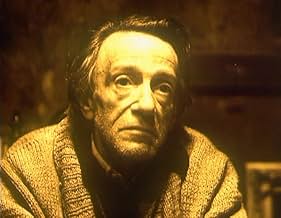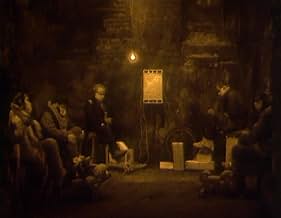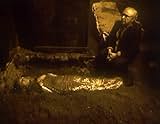Nach dem nuklearen Holocaust sehnt sich eine Gruppe von Intellektuellen danach, in der blassen und farblosen neuen Welt Hoffnung zu finden. Unter ihnen versucht ein Geschichtslehrer, per Bri... Alles lesenNach dem nuklearen Holocaust sehnt sich eine Gruppe von Intellektuellen danach, in der blassen und farblosen neuen Welt Hoffnung zu finden. Unter ihnen versucht ein Geschichtslehrer, per Brief Kontakt zu seinem vermissten Sohn aufzunehmen.Nach dem nuklearen Holocaust sehnt sich eine Gruppe von Intellektuellen danach, in der blassen und farblosen neuen Welt Hoffnung zu finden. Unter ihnen versucht ein Geschichtslehrer, per Brief Kontakt zu seinem vermissten Sohn aufzunehmen.
- Regie
- Drehbuch
- Hauptbesetzung
- Auszeichnungen
- 1 wins total
- Khyummel-otets
- (as I. Ryklin)
- Anna
- (as V. Mayorova)
- Pastor
- (as V. Dvorzhetskiy)
- Tereza
- (as S. Smirnova)
- Vrach
- (as Ye. Platokhin)
Empfohlene Bewertungen
It's more a natural extension of the sort of bleak, introspective, and visually stylized substance of certain Tarkovsky films, and rather than suggesting Lopushansky was ripping off Tarkovsky, I instead hope to compare them in a way that's complementary to Lopushansky. In fact, Dead Man's Letters has moments that got to me more on a gut level than just about anything Tarkovsky directed, and with this film, he really doesn't overstay his welcome with a runtime of 83 minutes (some Tarkovsky films can have somewhat challenging runtimes).
It's the fact both made movies in Russia, both dealt with dark subject matter, and both were willing to use similarly striking color schemes visually that makes me want to compare the two. At the risk of disparaging Tarkovsky, too, it's been many years since I saw the bulk of his filmography, and now I'm older (though not necessarily wiser), I may be able to go back and appreciate certain titles of his some more. As for Lopushansky, the only other film of his I've seen is 1989's A Visitor to a Museum, which is similar to Dead Man's Letters in some way, albeit longer and more ambitious... surprisingly, I think I like Dead Man's Letters a little more, though.
It's worth experiencing for its atmospheric post-apocalyptic qualities alone, as well as for a couple of key sequences that really sneak up on you and prove devastating. It's not a fun watch, but it felt rewarding and worth the time for sure.
There is barely any storyline. The main character is an unnamed scientist who lives in a makeshift shelter under a museum, among saved relics from all eras of history and some of his surviving colleagues. Being all scientists they are trying to grapple the whole point of what happened. There are no names, except for the wife and son of this scientist: Anna and Eric. Eric is presumably dead as he was outside when the bombs exploded. Nevertheless the scientist keeps writing letters to him, in a form of a diary, which is more to save his last thoughts of the world than actually meant to be delivered someday.
The pace of this film is just as slow and time would be in such a situation. Soviet art movies were not bound by economic constraints so it did not matter to their makers whether the tickets will sell well or not. Modern moviegoers would find the entire thing profoundly boring, and even the most dedicated movie hipster would look at the clock time to time. Being this slow is part of the image the movie builds. Just like the characters, the viewer is also immersed in an endless waiting, never to know whether something is going to change or happen. You actually have to watch it to the very end to see. Don't expect rich experiences. In such a dull and dead world it's a rare gift to see anything happen.
Interestingly, the makers took great care to emphasize that this is not happening in the Soviet Union. Or more exactly, it could happen, but this particular place is not a Soviet city. There is not a single object in the background with Cyrillic letters on it, but there are a lot of things with English labels, some are even consumer goods rare behind the Iron Curtain at that time. German beer cans float in the water - canned beer was a curiosity that time - and a bottle of Jagermeister is seen on a desk. Canned foods are also foreign, with English labels. Even the soldiers carry weapons that look like a crossbreed of American M-16 and M-1 rifles. It's a small detail, but back then every able-bodied Soviet men were familiar with Soviet military equipment, having spent years as a conscript, and this clue is giving away that the scene takes place in a foreign country. Even the military vehicles were selected to keep this illusion. The helicopter is a Ka-26 which was never used by the military (in the Soviet Union at least), the large truck is a MAZ missile trailer, but there was also a civilian version of it. The then- futuristic hovercraft that appears for no apparent reason was an experimental vehicle at the time, but such vehicles were already operating as ferries on the English Channel, and were praised as a great technical advancement of the time.
I'd generally recommend this movie for those who are desperate enough to take a plunge into a strange, lost civilization's vision of the violent end of the world. Not a date movie, except if your date is a hardcore movie culture fanatic or grew up in the Soviet Union.
Letter from a Dead Man, established amidst the panic of a nuclear holocaust, the result of the irrational arms escalation with which the United States and the Soviet Union were putting pressure on each other and which threatened to transform life on our planet into something impracticable. However, the accident at the Chernobyl plant, which occurred five months before the premiere of this film, determines its most obvious message.
The panic to lose everything is definitely achieved, to reset the historical evolution of one single action, to forget the identity of species and break the commonly admitted social contract was identical in capitalism and socialism, especially because it was the common sense of the ordinary citizen who was demonstrating in pursuit of a understanding. What was the point of mutual annihilation, if no one would emerge victorious from the final battle? What is the goal of total domination, if there is nothing left to dominate? What is the meaning of the will to try to impose your own model, if the future is nothing more than a barren terrain lined with rubble?
But despite the uncompromising staging of the film, Konstantin Lopuschanski retains, maybe naturally, a humanistic core. Aside from the anti-nuclear aspect, "Letter From a Dead Man" is a haunting reminder for reason, in the resolute emphasis on human humanity, which ultimately represents a final anchor of hope. Therefore, the film closes with a quote from the infamous 1955 "Russel Einstein Manifesto" against nuclear war: "There lies before us, if we choose, continual progress in happiness, knowledge, and wisdom. Shall we, instead, choose death, because we cannot forget our quarrels? "
The protagonist and his fellow sufferers are constantly preoccupied with questions about humanity, about the conditions of the human race and the absurdity of war. A resident of the museum bunker, for example, dictates a pathetic pamphlet to his secretary about the fatality of the civilization process in the machine, marked by deep disgust for progress and the awareness of the ultimate end of humanity - as a testament for subsequent civilizations. "Mankind was a tragic species, doomed perhaps from the very beginning." One of the roommates expresses his deep love for humanity in a farewell prayer shortly before his suicide; "Love created art, an art which reflects our unbearable yearning for perfection, our immense despair, our endless cry of terror..."
there is a also a great thought-provoking scene where the professor (the protagonist) remembers his childhood nightmare; when he was frightened by a big locomotive; and now it seems to him that it was he - with his inventions - who created the giant locomotive that overran humanity: and his most terrible dream is the one in which he sees his son on the rails...
Finally the professor tells his prodigal son the story of his fears, dreams and research, all of which together expresses one thing: his ambivalence between hope and self-abandonment, which characterize his whole situation and the essence of the movie. The movie also gives more suggestion to an existentialist and humanistic side that states that the face of death is not scary anymore given that everything has perished. And that hope can still be found in youth as the only remaining symbol of innocence, and that it is impossible to imagine that humanity will be wiped out permanently from the face of the earth.
Lopushansky assisted Tarkovsky during the production of Stalker - and that influence is clearly visible in every shot. that is its: sepia tones, long, static shots or slow driving on the landscape, melancholy intonation of caring questioning about where modern man is heading imbued with religious faith, etc. Visually, almost the entire film is coloured of sepia, brown-black, a ugly, grainy, 'dirty' sepia. it's not that high-contrast, sharp and somehow 'beautiful' sepia of STALKER. This is a film about a world that has driven itself to the grave, with a slow, elegiac, torturous atmosphere, it shows the last twitches of a man's futile attemps to save humanity.
But given all these great quotes etc, the movie's plot, in the beggining, is hard to grasp and many big factors in the film is not understandable at first. Thus it have a relatively poor structure and narrative.
The story revolves on Rolan Bykov as a scientist – former Nobel Price winner, even – who entrenched himself underneath the remnants of a library building along with his wife and a handful of co-workers. The titular letters are addressed to his son whom the scientist hasn't seen or heard from since the catastrophe. The letters and above all the hope his son is still alive somewhere is what keeps the poor man going, but how long can you hold on to hope when you see everything and everyone around you dying? "Letters from a Dead Man" is a difficult but ultimately very rewarding cinematic experience to endure. Difficult, of course, because of the emotionally devastating imagery and atmosphere, and because there's actually very little substantial content. We literally stare at a handful of people languishing and eventually dying, with only a small hint at hope near the end. And rewarding because of the depiction of genuine humane sentiments and the thought-provoking messages. It's also highly remarkable how "Letters from a Dead Man" remains continuously vague regarding the cause of the apocalypse and eventually even searches the guilt in the own heart. In a time where movies released on the other side of the Iron Curtain (in Europe and particularly the USA) routinely blamed Russia for the potentially upcoming apocalypse, this tale suggests the root cause of the catastrophe lies in a human error during the launch of a space shuttle. The entire cast gives away tremendous performances. I don't know if these people are veteran actors and actresses in their home countries, but their grimaces and catatonic behavior suggest that they were selected especially for this type of discouraging parable. Fantastic film; though obviously not fit for all occasions and/or audiences.
WUSSTEST DU SCHON:
- WissenswertesThe filmmakers took great care to continuously remind their viewers that what they're seeing is not happening in the Soviet Union. To ensure this, a lot of foreign items have been placed in the backgrounds which surely immediately caught the eye of the contemporary viewer. There is not a single object with Cyrillic letters, but there are plenty with English ones. Many items are Western consumer goods which were rare in the Soviet Union in the 1980s. Particular examples are beer cans and a bottle of Jagermeister on a desk. The weapons the soldiers wield are also not even resembling Soviet rifles which would've been familiar to all viewers who completed their military services. They look more like a strange "crossbreed" of American M-16 and M-1 rifles. The vehicle the soldiers are using is a MAZ missile trailer truck, but the same vehicle was also built for the civilian market and sold to many countries. The helicopter that shows up in one of the scenes is a Kamov Ka-26 which was never used by the Soviet military (and in fact only one Warsaw Pact country did, Hungary). The hovercraft that is seen turning and leaving is also not a (known) military vehicle, but anyone in the 1980s should've associated the image with the air-cushion ferries on the English Channel which were a famous and novel technical achievement at the time.
- Zitate
Unknown: We should acknowledge the fact that the whole history of mankind is a story of a slow suicide commited by a living matter that by sheer accident acquired the abilty to think, but that did not know what to do with this fateful capacity. Full stop.
Top-Auswahl
- How long is Dead Man's Letters?Powered by Alexa
Details
- Laufzeit1 Stunde 27 Minuten
- Farbe
- Sound-Mix
- Seitenverhältnis
- 1.37 : 1
Zu dieser Seite beitragen


